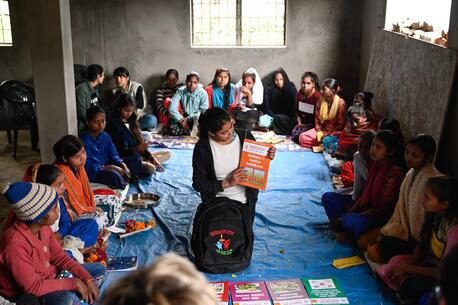Bill Gates’ Annual Letter and UNICEF
Bill Gates released his “annual letter” today, presenting a candid take on the work and learnings of his foundation. His 2013 focus? Measurement. Gates cites UNICEF and its beloved former Executive Director James Grant as “the best example of picking an important goal and using measurement to achieve it.” Though Grant is not a household name, Gates maintains that “(his) impact on the world is as significant as any profit-driven leader like Henry Ford or Thomas Watson.”
Bill Gates released his “annual letter” today, presenting a candid take on the work and learnings of his foundation. His 2013 focus? Measurement. A topic that does not grab headlines, but for UNICEF, benchmarking progress is as central to our work as the vaccinations and clean water we supply to children. When the goal is to save children’s lives, there is no time or money to waste, and that’s why UNICEF loves data. We’ve invented ways to collect it via camel, motorbike and SMS. Data helps us make smart choices about how to help children more effectively. We share our data with the world, so other organizations and governments can enrich their own work for children.
 UNICEF Executive Director James Grant visits a classroom in Bangladesh. ©UNICEF/NYHQ1990-0002/Shehzad Noorani
UNICEF Executive Director James Grant visits a classroom in Bangladesh. ©UNICEF/NYHQ1990-0002/Shehzad Noorani
Gates cites UNICEF and its beloved former Executive Director James Grant as “the best example of picking an important goal and using measurement to achieve it.” Though Grant is not a household name, Gates maintains that “(his) impact on the world is as significant as any profit-driven leader like Henry Ford or Thomas Watson.” Some would say Grant was obsessed with measurement. In fact, he was obsessed with ending the preventable deaths of children. In 1980, Grant boldly declared that UNICEF and partners would increase global immunization coverage from 17% to 80% within a decade. This idea was deemed impossible by many of Grant’s peers, who referred to him as “the mad American” and called for his resignation. By 1990, immunization rates reached 75% and Grant was no longer ridiculed. Measurement is critical to achieving our goals. By honestly assessing our work, we know if we are moving closer to the goal, or if we are missing the mark. If we are seeing results, we want to replicate and accelerate that work, and if we are not progressing as hoped, we need to make adjustments. But if no one is measuring, there is no way of knowing what’s working, and precious time is lost. Consider that each day, 19,000 children under age five die of preventable causes. There is no more urgent cause than bringing that number to zero.

